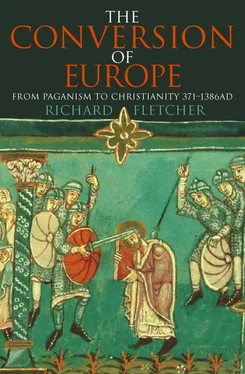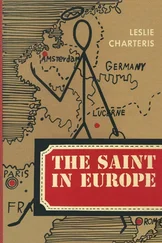1 ...7 8 9 11 12 13 ...40 The author of this account, numbered among the audience of Ponticianus, was Augustine, later to become bishop of Hippo in north Africa. It occurs in his Confessions , the greatest work of spiritual autobiography ever written.
Augustine is important for us because out of his voluminous writings can be constructed a theology of mission which was to have far-reaching influence upon the concerns of the western church. In the first place, he was an African, and thereby the heir to a distinctive Christian tradition. The African church looked back to Tertullian (d. c. 225), lawyer and prolific Christian controversialist, and to Cyprian (d. 258), bishop of Carthage and martyr. The writings of these two fathers of the African church had expressed a rigorist view of Christianity, one which sought to keep the secular world at a distance. This intellectual tradition, widely respected in the western, Latin provinces of the empire, gave a twist to the character of western Christianity which differentiated it from the Christianity of the eastern, Greek provinces of the empire. Where the east, schooled by Origen and Eusebius, was assimilationist and welcomed the co-existence of the church and the world, the west tended to see discontinuities and chasms, and maintained a distrust for secular culture. If in the east church and state were nearly identical, in the west they were often at odds. Harmony was characteristic of the east, tension of the west. It was to be a critically important constituent of western culture that church and state should be perceived as distinct and indeed often competing institutions. Built into western Christian traditions there was a potential rarely encountered in the east for explosion, for radicalism, for non-conformity, for confrontation. To these traditions Augustine was the heir; to them he contributed in no small measure. His was a discordant voice in the general chorus orchestrated by Eusebius in celebration of the Christian empire. It would matter very much indeed that Augustine’s would prove to be among the most powerful and influential voices that western Christendom has ever heard.
It has not always been discordant. As a young man Augustine enjoyed a brilliant career as an academic in Milan. (He was living in Milan when he heard the story of the encounter at Trier quoted above.) At that date Milan was the political and intellectual capital of the western half of the empire. Its bishop, the great St Ambrose (d. 397), was the most prominent western advocate of the views of Eusebius (though not without some qualifications). Ambrose exerted considerable influence on Augustine, who was attracted to the Eusebian perspective. Significantly, it was only when Augustine abandoned this glossy metropolitan life in 395 and returned to his native Africa to become a small-town bishop – living in obedience to a monastic rule with his diocesan clergy – that misgivings began to arise in his mind. But they were not formulated in any coherent fashion until he composed the work for which he is most famous, De Civitate Dei ( The City of God ), between 413 and 425. This is a book so big, so complex, so alive, so rich in ideas, so brimming with passion, that it is difficult to summarize it in any manner which does it justice. It is commonly said that the work was occasioned by the sack of Rome by the Goths in 410: an attempt to answer the pagans who claimed that Rome had been sacked in punishment for her abandonment of the gods who had always previously protected her. But Augustine’s book was intended, or at any rate turned out to be, a great deal more than this. In its final form it was an extended meditation on the meaning of history, on the place of man and society and the state in the divine scheme of things, and on the nature of the Christian community within the world. In the course of it Augustine came out with views sharply at variance with the Eusebian accommodation.
For our purposes the most important point about Augustine’s social thought is that he detached the state – any state, but in particular, of course, the Roman state – from the Christian community. Under his hands the Roman empire became theologically neutral, drained of the positive moral charge with which Eusebius had invested it. For Augustine the empire was just one set of political arrangements among many. It was necessary for the purpose of ensuring certain limited ends such as the maintenance of peace and order, the administration of human justice or defence against aggression from outside its frontiers: necessary, but in no sense special or privileged. This was to strike at the root of the Eusebian position. The empire was not part of a divine providential scheme; not the vehicle for the furtherance of God’s purposes. Its emperor was not messianic, not quasi-divine; he no longer walked with God. Its institutions were ordinary institutions, human, fallible, random, limited and messy. Its history was not the unfolding of a plan for the harmonious ordering of the world under a God-directed emperor, but instead a squalid tale of lust for domination, of war and suffering, of oppression and corruption. Worldly empires would blow away like smoke; and, as Augustine dismissively observed, ‘smoke has no weight’.
Over against this earthly polity is set the city of God: that is, the community of Christians whose city is not of this world, who indeed are aliens ( peregrini ) in this terrestrial world. Such notions were not new. There was a rich Judaic literature of exile which was developed by early Christian writers. It was Paul who wrote to the Corinthians of ‘an house not made with hands’. The anonymous author of the Epistle to Diognetus , writing in about 200 and echoing another Pauline passage, had observed that Christians ‘spend their existence upon earth, but their citizenship is in heaven’. 8 There were also influences at work from outside the Judaeo-Christian tradition. The Neoplatonic philosophers who strongly influenced the young Augustine had written persuasively of the soul imprisoned in the body, trapped in the flesh, from which it strives to break free. What Augustine did was to express these ideas of exile and alienation with passion and force. To one word in particular he imparted a special resonance: peregrinus. ‘And so long as he is in this mortal body, he is a peregrinus in a foreign land,’ he wrote in Book 19 of De Civitate Dei , echoing II Corinthians v.6. It was a technical term in Roman law: to be a peregrinus meant to be a resident alien, a stranger, a person without kin, friends, sureties, patrons. It was also a word with further connotations within the Judaeo-Christian scriptural tradition. Exile or deprivation were often associated with sin and punishment, but sometimes also with a sense of divinely allotted destiny. Jacob fled into exile because of murderous conflict between kinsmen; his destiny was to inherit the land of his exile or pilgrimage ( peregrinationis ) and through him were all peoples of the earth to be blessed (Genesis xxviii). So a pilgrim could also be a harbinger, like John the Baptist. Augustine seized upon the possibilities latent in this everyday word. Here was an exacting standard for the Christian. He must become a peregrinus , an exile or pilgrim, make of his life a peregrinatio , a pilgrimage, cutting loose like a monk from the worldly ties that bind and accepting instead the liberating society and disciplines of the city of God: ‘The Heavenly City, while on its earthly pilgrimage, calls forth its citizens from every nation and assembles a multilingual band of pilgrims; not caring about any diversity in the customs, laws and institutions whereby they severally make provision for the achievement and maintenance of earthly peace.’ 9
Here then is Augustine’s vision of a Christian community not confined to the Roman empire. Other strands of his reading and reflection were woven into it. In common with other Christians of his day Augustine was convinced that the end of the world was near. But before this could happen there had to be a universal preaching of Christianity. ‘This gospel of the Kingdom will be proclaimed throughout the earth as a testimony to all nations: and then the end will come.’ Augustine was forced to elucidate this apocalyptic passage in Matthew’s gospel (Matt. xxiv.14) at the very time that he was working on De Civitate Dei. Prompted by an earthquake on 19 July 418 Bishop Hesychius of Salona (Split) consulted Augustine about Daniel’s prophecies of the end of the world. In his reply Augustine made reference to Matthew’s passage on the in-gathering of the nations which must precede the end and to other biblical passages of similar purport. But Hesychius, evidently a persistent man, was not satisfied and wanted more. He got it. Augustine, never one to skimp where doctrinal exposition was concerned, replied in a long letter divided into no less than fifty-four chapters. This second letter circulated widely as a separate pamphlet under the title De Fine Saeculi ( On the End of the World ). Hesychius had evidently claimed that the gospel had already been preached to all nations. Not so, argued Augustine, ‘for there are among us, that is in Africa, innumerable barbarian tribes among whom the gospel has not yet been preached … yet it cannot rightly be said that the promise of God does not concern them’ because ‘the Lord did not promise the Romans but all nations to the seed of Abraham’. He went on to elucidate ‘the prophecy made of Christ under the figure of Solomon, “He shall rule from sea to sea” (Psalm lxxii.8)’. This must mean ‘the whole earth with all its inhabitants, because the universe is surrounded by the Ocean sea’. All nations, therefore, ‘as many as God has made’ are to adore the Lord and call upon him. 10 But – and here Augustine turned to Paul’s words in Romans x.14–15 – ‘How shall they call upon Him in whom they have not believed? How shall they believe Him of whom they have not heard? And how shall they hear without a preacher? And how shall they preach unless they be sent?’ Augustine did not follow the logic of the argument to its conclusions: therefore we must send out missionary preachers. But we can see how a combination of influences – the African intellectual tradition, apocalyptic speculations, episcopal responsibilities, ideals of pilgrimage and renunciation – brought him to the brink of that conclusion.
Читать дальше












